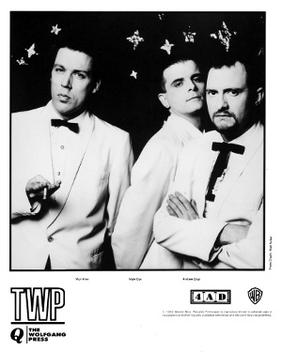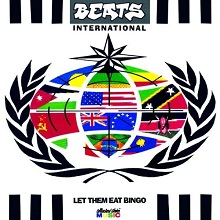
Pretty Hate Machine is the debut studio album by American industrial rock band Nine Inch Nails, released by TVT Records on October 20, 1989. Production of the record was handled by NIN frontman Trent Reznor and English producer Flood, among other contributors.

A Certain Ratio are an English post-punk band formed in Flixton, Greater Manchester in 1977 by Peter Terrell and Simon Topping, Jez Kerr, Martin Moscrop, Donald Johnson (drums), and Martha Tilson (vocals) joining soon after.

Goldfrapp are an English electronic music duo from London, formed in 1999. The duo consists of Alison Goldfrapp and Will Gregory (synthesiser).

Meat Beat Manifesto, often shortened as Meat Beat, Manifesto or MBM, is an electronic music group originally consisting of Jack Dangers and Jonny Stephens that was formed in 1987 in Swindon, United Kingdom. The band, fronted by Dangers, has proven versatile over the years, experimenting with techno, breakbeat, industrial, dub and jazz fusion while touring the world and influencing major acts such as Nine Inch Nails, the Chemical Brothers and the Prodigy. Some of the band's earlier work has been credited with influencing the rise of the trip hop, big beat, and drum and bass genres.

"Closer" is a song by American industrial rock band Nine Inch Nails, released as the second single on their second studio album, The Downward Spiral (1994). Released on May 30, 1994, it is considered one of Nine Inch Nails' signature songs and remains their most popular song. Most versions of the single are titled "Closer to God", a rare example in music of a single's title differing from the title of its A-side. The single is the ninth official Nine Inch Nails release, making it "Halo 9" in the band's official Halo numbering system.

Remixes 81–04 is a remix album by English electronic music band Depeche Mode, released on 25 October 2004. It was the band's first release since Daniel Miller's independent label Mute Records was acquired by industry major EMI in 2002. It features well-known remixes from the band's back catalogue, as well as previously unavailable mixes.

Francis John Tovey, known also by his stage name Fad Gadget, was a British avant-garde electronic musician and vocalist. He was a proponent of both new wave and early industrial music, fusing pop-structured songs with mechanised experimentation.

Bedouin Soundclash is a Canadian band based in Toronto and consisting of vocalist and guitarist Jay Malinowski, bass player Eon Sinclair and drummer Chuck Treece. Their sound has been described as a combination of reggae and ska. Bedouin Soundclash was formed in 2001, and has released six studio albums, most recently in 2022.

The Wolfgang Press were an English post-punk band, active from 1983 to 1995, recording for the 4AD label. The core of the band was Michael Allen, Mark Cox (keyboards), and Andrew Gray (guitar).
Renegade Soundwave were an electronic music group. Formed in London in 1986, the group originally consisted of Gary Asquith, Carl Bonnie and Danny Briottet. Their debut LP Soundclash was released in 1990 on Mute Records. It featured the UK Top 40 hit "Probably a Robbery" and dancefloor favourite "Biting My Nails".

"Policy of Truth" is a song by English electronic music band Depeche Mode, released on 7 May 1990 as the third single from their seventh studio album, Violator (1990). It is the only Depeche Mode single to chart higher on the US Billboard Hot 100 chart than on the UK Singles Chart, and it became the band's second chart-topper on the Billboard Modern Rock Tracks chart.

"I Feel You" is a song by English electronic music band Depeche Mode, released on 15 February 1993 as their 27th UK single and the first single from their eighth studio album, Songs of Faith and Devotion (1993). The song peaked at number eight on the UK Singles Chart and also made number one and number three on the US Billboard Modern Rock Tracks chart and the Billboard Hot Dance Club Play chart. It is one of the band's highest-charting singles worldwide. The accompanying music video was directed by Anton Corbijn.
Rhythm King Records Ltd was a British independent record label, founded in the mid-1980s by Martin Heath, Adele Nozedar, DJ Jay Strongman and James Horrocks. It was based in Chiswick, London.

Storm the Studio is the debut album by English electronic music group Meat Beat Manifesto, released on 20 February 1989 by Sweatbox Records in the United Kingdom and later that year by Wax Trax! in the United States. Recorded in three recording studios, the album contains four compositions, each split into separate parts, that mostly originated as twelve-inch singles the band released in 1988. The record's inventive musical style features elements of industrial music, electro, dub, noise rock and hip hop music, and incorporates breakbeats, noise and sporadic rap vocals. The group also incorporated heavy usage of sampling in a fashion they compared to pop art. Television was a further influence on the record, and numerous items of television dialogue appear throughout Storm the Studio as samples.

Romance Is on the Rise is an album released in July 1974 by Genevieve Waite. It was produced by her then husband, John Phillips. The album was fairly well received and in 1977 it made number No 98 on Paul Gambaccini's list of the Top 200 Albums of All Time.

"Dub Be Good to Me" is a song by British dub group Beats International featuring singer Lindy Layton, released on 24 January 1990 as the first single from their debut album, Let Them Eat Bingo (1990). It was written by frontman Norman Cook and interprets the SOS Band's 1983 hit "Just Be Good to Me", which it is named after. It also samples the songs "The Guns of Brixton" by the Clash, the Once Upon a Time in the West theme by Ennio Morricone, and "Jam Hot" by Johnny Dynell.

"Into the Blue" is a song by American electronica musician Moby, released on June 19, 1995, as the fourth single from his third studio album, Everything Is Wrong (1995). American musician Mimi Goese co-wrote the song with Moby and provided the vocals. The song is slow and melancholy, a stark contrast to the first four singles from the album.

Wha'ppen? is the second studio album by British ska band the Beat, released in 1981 via Go-Feet Records in the United Kingdom and Sire Records in the United States. After the critical and commercial success of I Just Can't Stop It (1980), which mixed ska, reggae and punk rock with social lyrics, the band changed direction on Wha'ppen?, taking influence from many other musical styles which were intriguing the band, including African, steel band and dub music, while keeping reggae at its core. The fast pace of the band's previous work is also exchanged for a slower, mid-tempo pace. Accompanying the music is the socially conscious and political lyrics. The band recorded the record at Roundhouse Studios with producer Bob Sargeant.

"Everything Starts with an 'E'" is a song by English electronic music group E-Zee Possee featuring vocals from MC Kinky. It is considered by many to be the anthem of the acid house movement of the late 1980s, with the "E" in the title widely understood to refer to the drug Ecstasy (MDMA).

Let Them Eat Bingo is the debut album by British electronic project Beats International, released in spring 1990 on Go! Beat in the United Kingdom and Elektra in the United States. The project was founded and led by disc jockey and former Housemartins bassist Norman Cook, who produced the album alone and intended Beats International to be a collective of permanent and temporary members including singers and other performers. Cook is joined on the album by a host of contributors, including Lindy Layton, Billy Bragg, Double Trouble, and Captain Sensible.



















